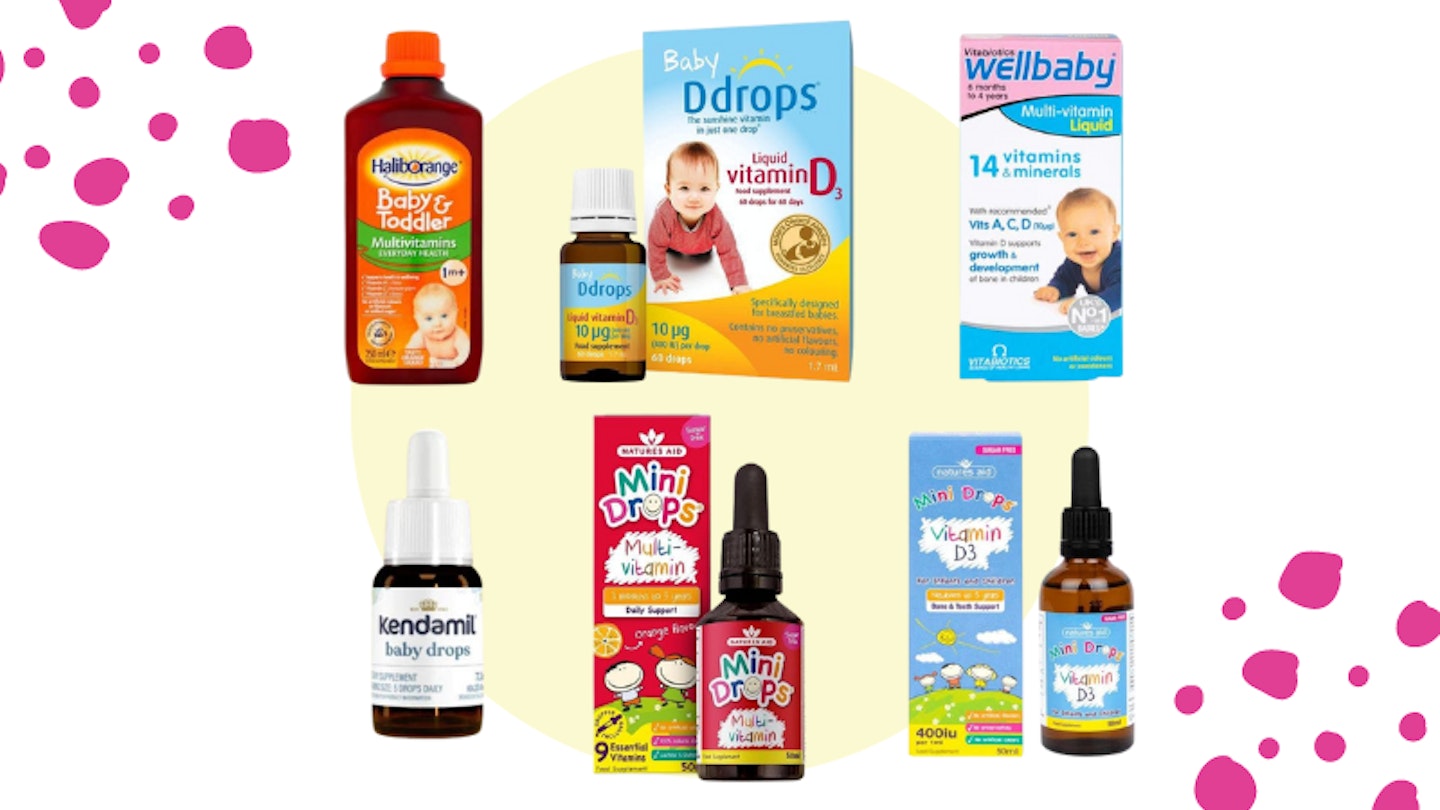
Medically Reviewed by: Alexa Mullane
With so many options to choose from, how are you meant to know which are the best baby vitamins for your little one? It’s no wonder parents feel overwhelmed thinking about what babies really need.
We’ve rounded up our top picks for the best baby vitamins to help you out. We’ve chosen popular, trusted brands with verified reviews from parents, so you can feel confident in your choice. If you’re unsure what’s best for your baby, speak to your healthcare professional for personalised advice.
We also spoken to experts to answer all your questions about using baby vitamins, including Clinical Nutritionist Eva Hill Hamilton, registered Dietitian and Author Jo Travers, registered Nutritional Therapist Julie Clarke, and registered Midwife Emma Thompson – as well as asked Nutritional Therapist and Health Coach Alexa Mullane to medically review the information in this article for accuracy.
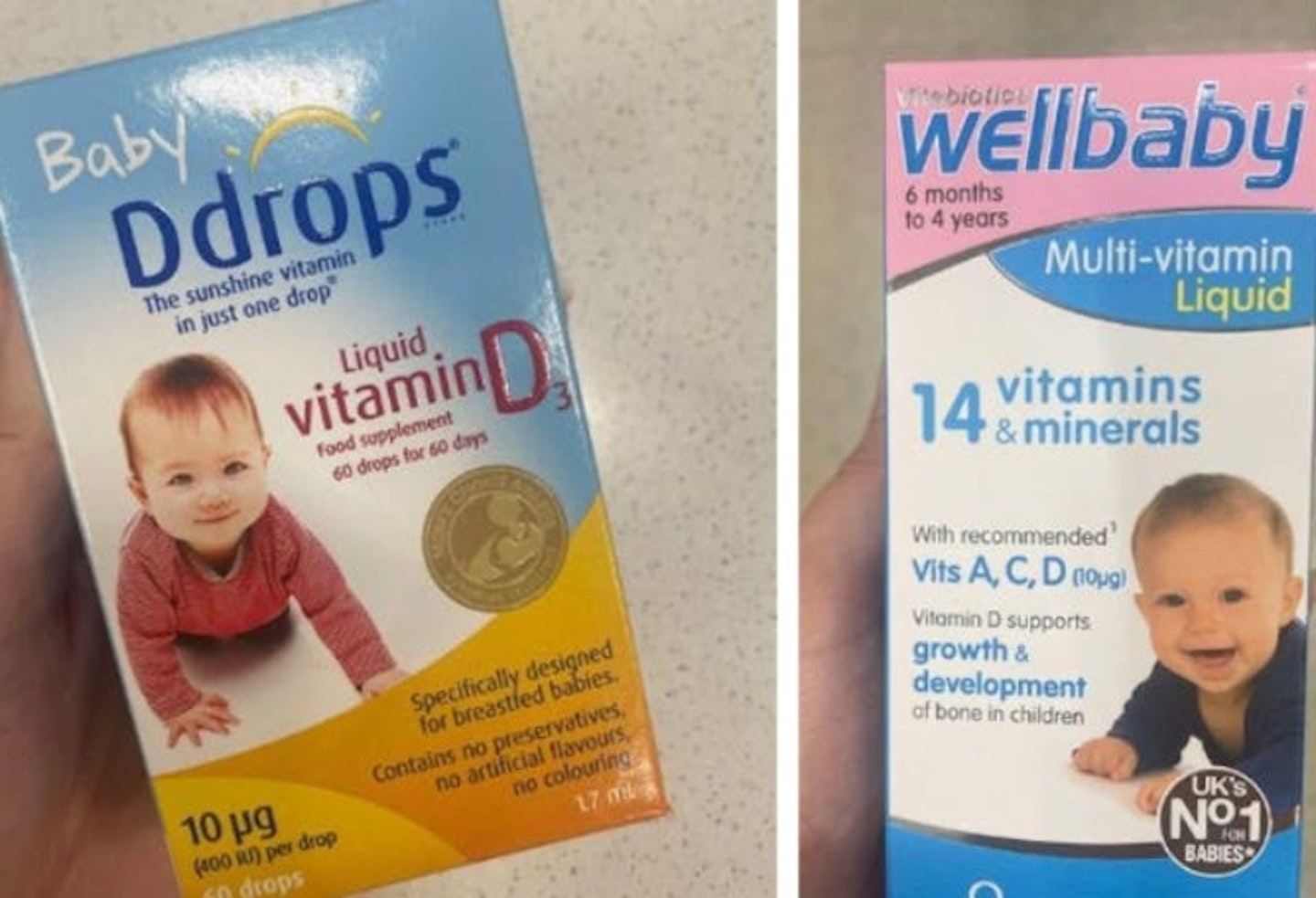
Best baby vitamins at a glance:
Why give your child vitamins?
Even if your child eats a balanced diet (when they’re not turning their nose up at veggies!), vitamins can help fill nutritional gaps to support their growth and immune health. Key nutrients like vitamins A, C, and D are especially important for building strong bones, boosting immunity, and supporting overall development – nutrients that some children may not get enough of through diet alone.
Registered Family Nutritionist Julie Clark says: "Vitamins and minerals are essential for normal growth and development, particularly in the early years, as your child’s body is growing quickly and they’re used for chemical reactions within the body. Their key roles are to help the body use up the calories in food, process fat, protein and carbohydrates, and help in the repair and building of cells and tissues."
How we chose the best baby vitamins
To round up our list of the best vitamins for babies and children, we spoke to experts and parents, and we researched verified purchase reviews so we could be confident that these are the best out there for a range of ages and requirements.
We've also asked experts to answer your frequently asked questions, including whether vitamins are necessary for babies and what vitamins you should be looking for. According to the NHS, breastfed babies should receive a daily vitamin D supplement of 8.5 to 10 micrograms from birth, while formula-fed babies who drink more than 500ml of formula a day typically don’t need extra vitamin D supplements, as the formula is fortified with this vitamin. So scroll down to the bottom for all the information you need to make an informed decision.
When shopping for vitamins for your child, you should check the product’s age suitability and look for trusted brands that meet safety standards. Opting for sugar-free formulas can also help protect their teeth. Don't forget, it's always important to talk to your GP or a pharmacist for advice.
The best baby vitamins 2025:
SAVE 40%
Best baby vitamins overall
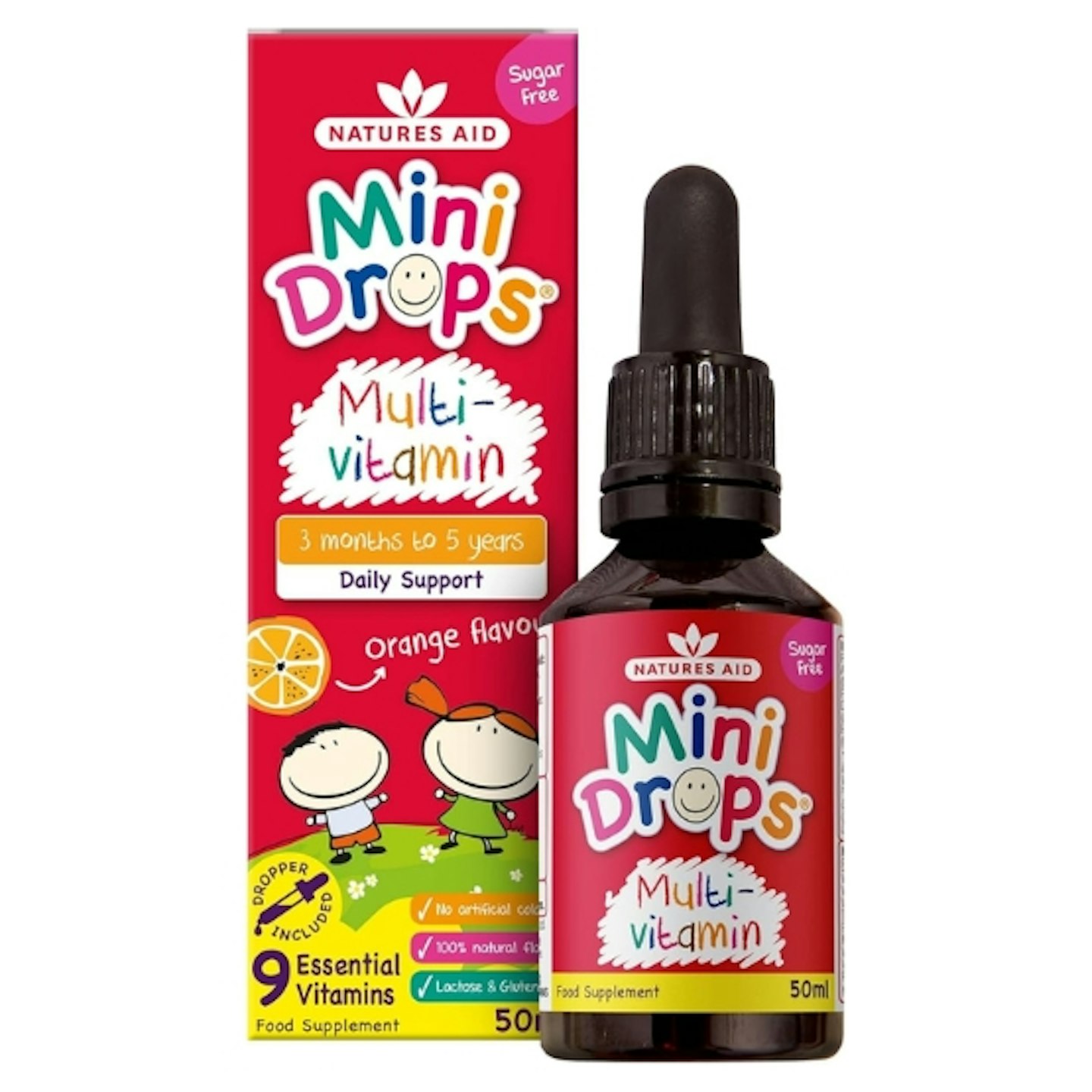 Image: Amazon
Image: AmazonIf you're on the hunt for the best multivitamin for baby, this one has been designed specifically for babies, infants and children aged three months to five years. We've chosen these Natures Aid Mini Drops Multi-Vitamin as our best baby vitamin overall as they can be added to food or drink for an easy, fuss-free way of giving your baby their vitamins. Parents appreciate how easy the product is to use, with it being in liquid form and with a dropper included. One reviewer said, “Love these drops for my daughter, we use them every day, the ease of the dropper makes it so good. My daughter enjoys helping use it and likes the taste”.
It’s made up of nine different essential vitamins, including vitamins C, D, B1, B2 and Niacin, to support normal energy production, and one reviewer felt that it gave her peace of mind as it “has the vitamins (her daughter) needs for the day”.
They’re made from 100% naturally sourced ingredients, are sugar-free and don’t contain any artificial flavours, sweeteners or colours – but parents said their children liked the orange taste, with one reviewer saying, “We've tried a few baby vitamin drops, but our little one hated all of them. This product has the same smell, but my son just loves it mixed with like 30-60ml of water."
Pros
- Liquid form so easier to add to food or drinks
- A dropper included to measure the right amount
- Free from sugar, sweeteners and artificial colours or flavourings
- Delicious orange flavour
Cons
- Not suitable from birth
| Volume: | 50ml |
| Flavour: | Orange |
| Primary supplement type: | Vitamin A, Vitamin D3, Vitamin B12 and Vitamin B6 |
| Suitable for ages: | 3 months to 5 years |
SAVE 5%
Best baby vitamins for gut health
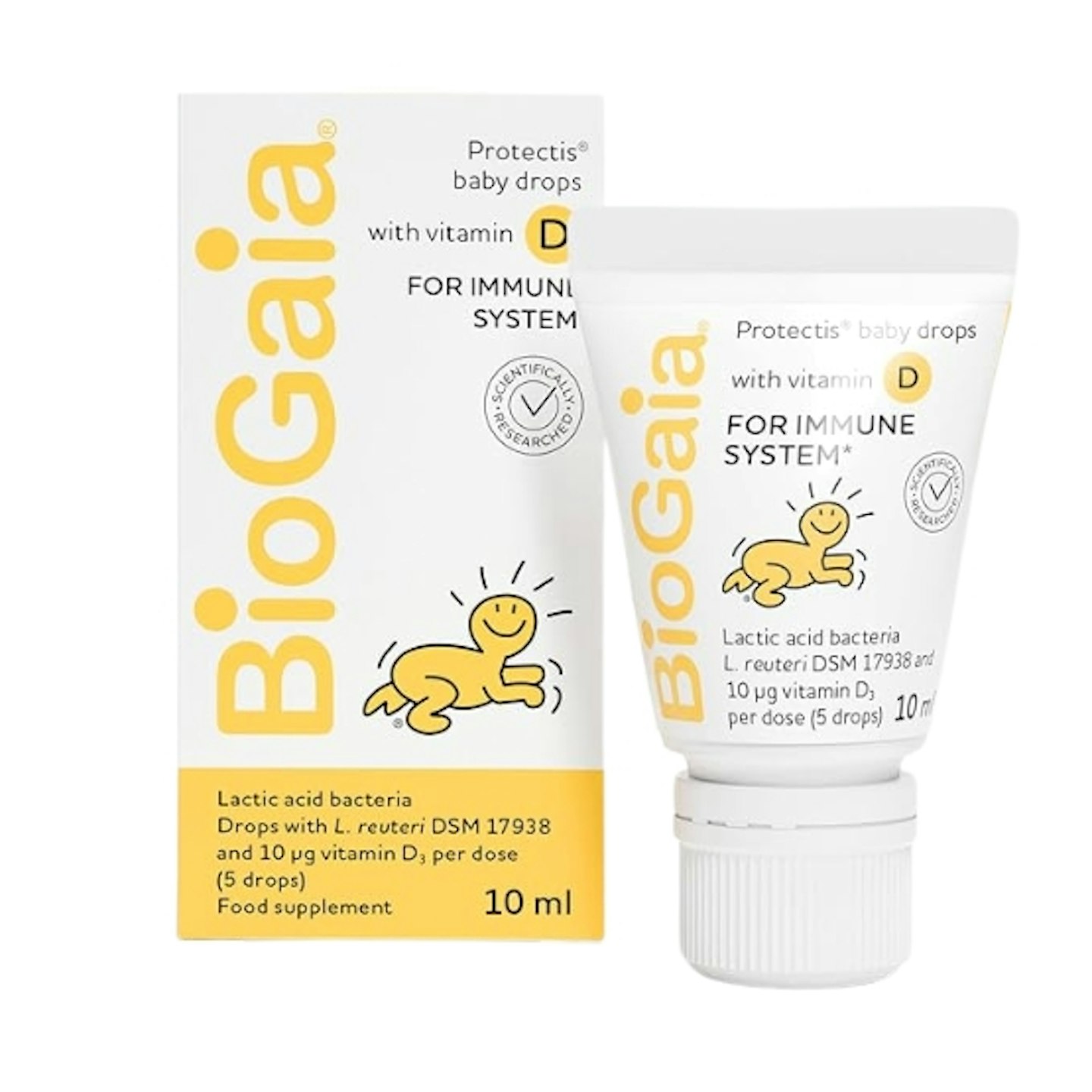 Image: Amazon
Image: AmazonIf your baby suffers from trapped wind but you also want to make sure they’re getting the vitamins they need, BIOGAIA Protectis Probiotic Drops could be the answer, and is definitely our favourite choice for gut health. This award-winning food supplement is a combination of a probiotic strain found in breast milk and vitamin D, helping to support gut health and contribute to the normal function of the immune system, as well as the growth and development of bone. It is safe from birth and can be taken with or without food.
Parents found that it helped when their babies were suffering from trapped wind or constipation, and one noted that her baby is “so much happier, sleeps easier and longer”. While it has a higher price point than some of the others on our list, parents felt that this was justified by the results, with one saying the “price is outweighed by the benefits of the product”.
Pros
- Supports baby's immune system and gut health
- Encourages good bacteria in the digestive tract
- It contains a probiotic strain found naturally in breast milk
Cons
- Only a small volume and more expensive than other vitamins
| Volume: | 10ml |
| Flavour: | None |
| Primary supplement: | Vitamin D |
| Suitable for ages: | Suitable from birth |
Looking for the best vitamins for newborns? Designed specifically for breastfed babies, the Baby Ddrops Liquid Vitamin contains 60 drops for 60 days. Mums agreed they’re easy to use as they’re administered by simply placing one drop directly onto the nipple before the baby latches or even onto a cleaned finger to pop into your little one's mouth. As they only contain two naturally sourced ingredients - pure vitamin D3 and fractionated coconut oil - you can be confident your baby isn't getting any artificial flavours, colouring or other nasties.
While it was mentioned that the dropper might not be that easy to use, most reviews say the opposite. Babies didn’t seem to notice any flavour change and took them happily, with one mum saying that they’re “hands down the best to use when breastfeeding. One drop does not disrupt feeding”. Another agreed, saying,” I wish I'd had these in those early weeks, as they are so easy, just a single drop on the nipple and done”.
Pros
- Provides 60 days' worth of Vitamin D for bone development
- No artificial colours or flavourings
- Easy to administer as just one drop is all you need
- Designed specifically for breastfed babies
Cons
- Some mentioned the dropper isn't that easy to use
| Volume: | 1.7ml |
| Flavour: | None |
| Primary supplement: | Vitamin D |
| Suitable for ages: | Birth to 1 year |
Best baby vitamins recommended by NHS
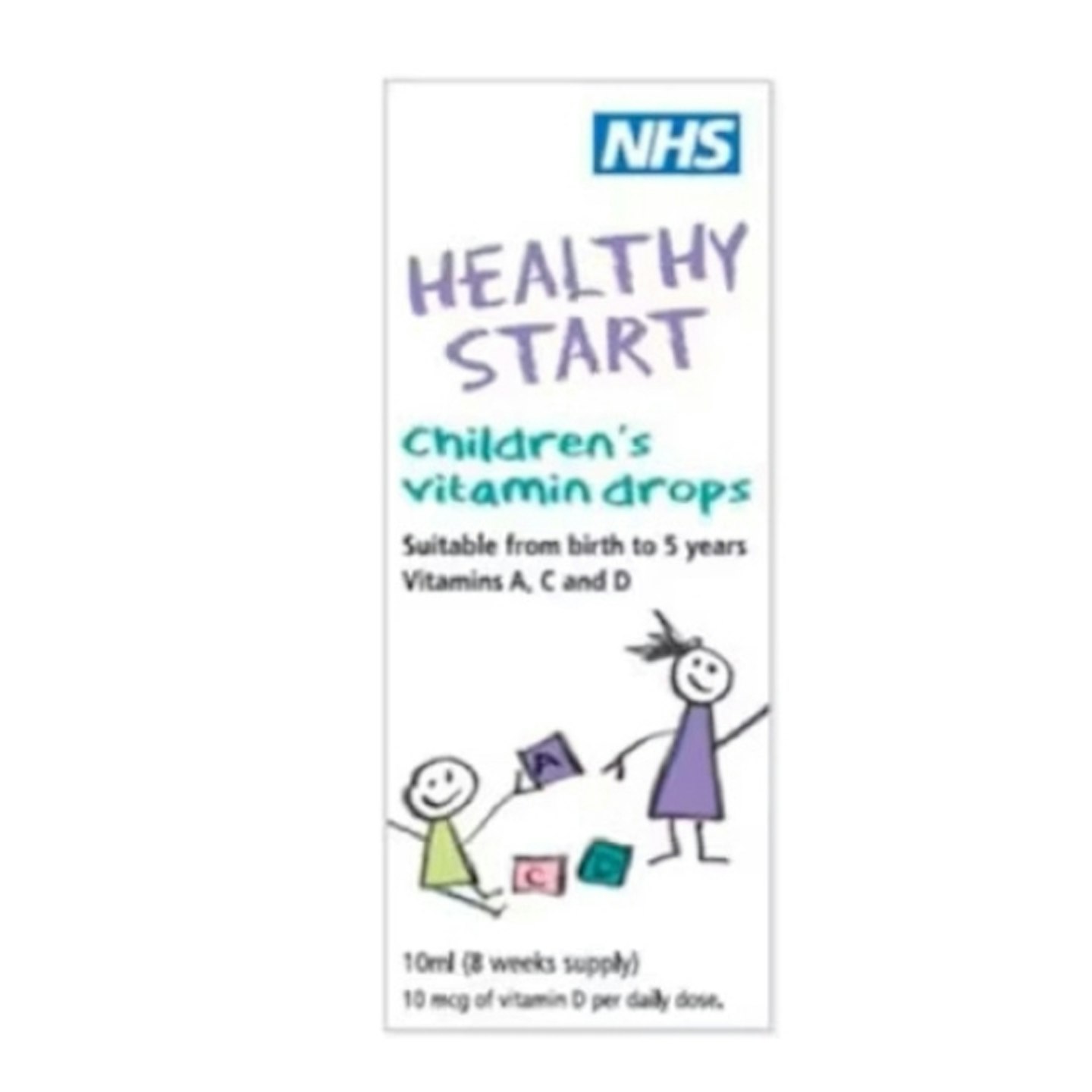 Image: Superdrug
Image: Superdrugwww.mypharmacy.co.uk
Containing three vital vitamins - vitamins A, C and D – these Healthy Start vitamins help maintain normal vision and the immune system and support the growth and development of normal bones. Most felt these were amongst the best value on the market, and felt reassured that they are NHS recommended. Some parent testers also got these from their health professionals, so it's also worth checking in with your local healthcare to see if you can.
They’re delivered in an oral drop, but give you the option to give directly using a spoon or mix them with milk, water, or juice. Most parents felt it was “easy to administer”, and one summed up the general feedback, saying, “My toddler can't notice it in his milk/water. A really easy way to give a child what they need!” Others mentioned it could take a while to dispense and “you do need a bit of patience to get the drops”.
Pros
- NHS recommended
- Pleasant tasting, so babies and infants were happy to take them
- Easy to use - can be given on a spoon or mixed with drinks
- It contains the three main vitamins recommended by Health Visitors
Cons
- Some felt the drops took a while to come out of the bottle
| Volume: | 10ml |
| Flavour: | None |
| Primary supplement: | Vitamin A, Vitamin C and Vitamin D |
| Suitable for ages: | Birth to 5 years |
SAVE 35%
Best baby vitamins for bone and teeth support
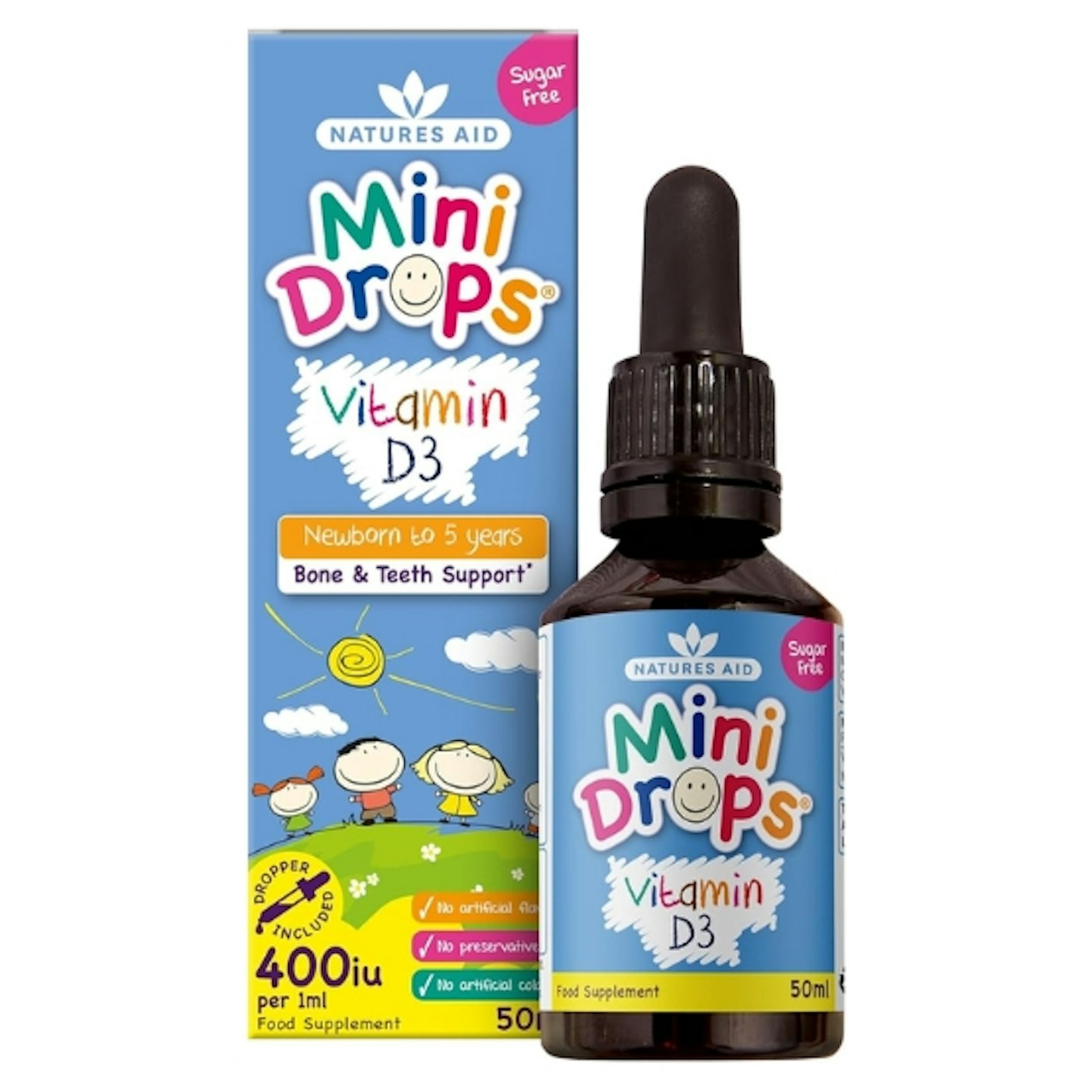 Image: Amazon
Image: AmazonWhat are the best vitamins for a baby 0-6 months? As one of the main vitamins recommended for babies from birth to the age of five, Vitamin D helps to support the immune system and muscle and bone growth, making this our top pick for bone and teeth support while your child is still developing. This award-winning Natures Aid Vitamin D3 Drops contains the suggested 400IU vitamin D to provide babies and infants with their daily dose.
As it has no odour or taste, it can be added to juice, water or food, or given straight from the dropper. Parents thought it was “quick and easy”, with one saying that her “kids do not like the taste of other vitamin D supplements, but they are very happy to take this one. I would definitely recommend it.” If you have a small baby, some have said it might be easier to add the drops onto a spoon or use a syringe, rather than the dropper.
Pros
- Helps support immune system and growth of muscle and bone
- Flavour and odourless, so easy to mix with drinks
- Contains the daily recommended amount of Vitamin D - 400iu
Cons
- Some mentioned you might need to add the drops onto a spoon or syringe for a baby
| Volume: | 50ml |
| Flavour: | None |
| Primary supplement: | Vitamin D3 |
| Suitable for ages: | Newborn to 5 years |
Best baby vitamins for value
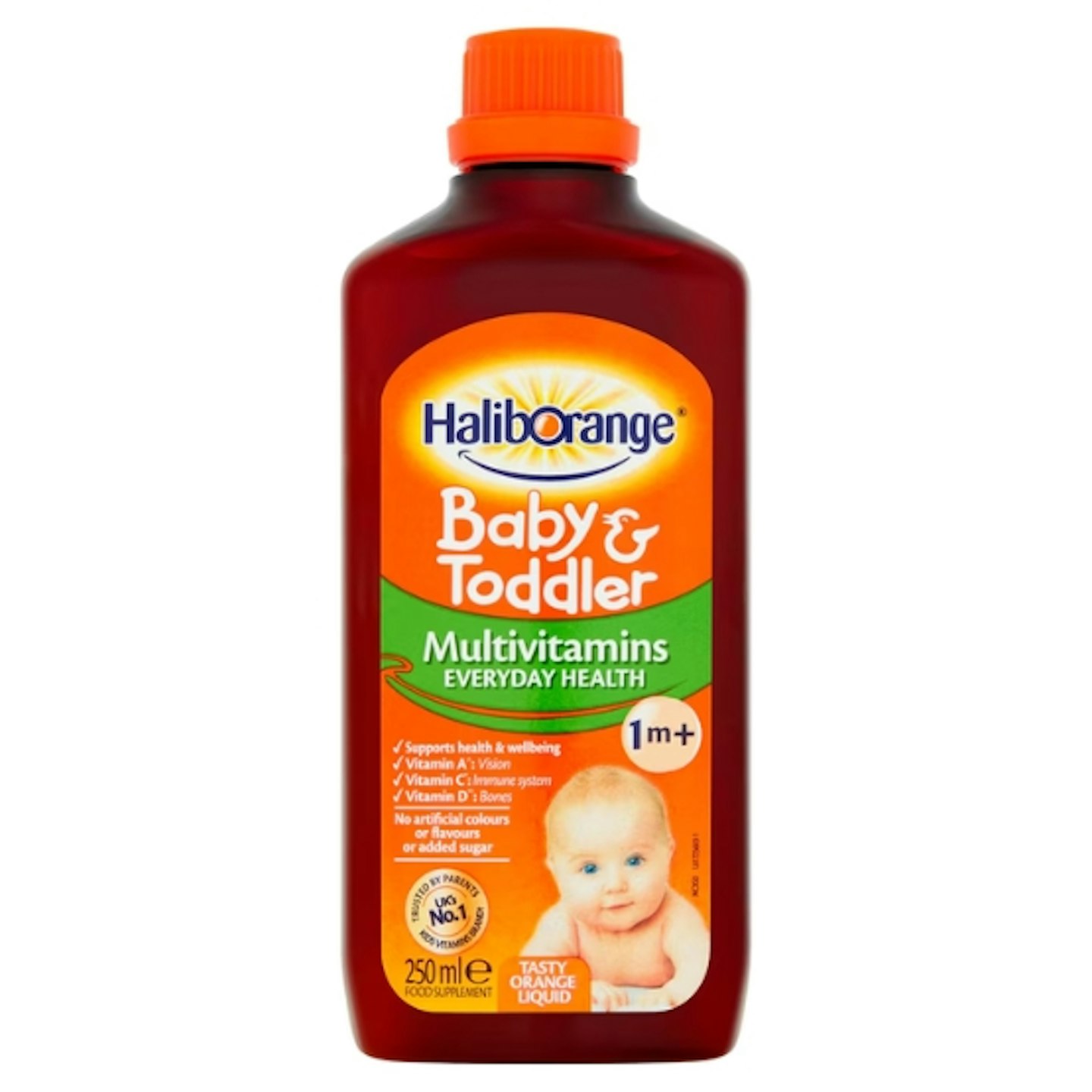 Image: Tesco
Image: TescoIf you're looking for the best value, the Haliborange Multivitamins Orange Liquid contains the recommended vitamins C, D and A but also includes the antioxidants E and B5 for normal mental performance and B2 to support the nervous system. It comes in a 250ml bottle too.
Parents agreed that their children enjoyed the flavour, with one parent reviewer saying that it’s “so far the only multivitamin my toddler looks forward to having” and another saying her “(fussy four-year-old) absolutely loves it and looks forward to having a spoon every day. Will continue to purchase.”
Although it doesn't come with a syringe or spoon, you need to ensure you do have one. Our tester, Samantha, also said that her son really enjoyed having these, and the flavour was the same as the Multivitamin Softies he started having when he was old enough. There are no artificial colours or flavourings, and it doesn’t contain any added sugar. We like that it's also suitable for vegetarians.
Pros
- Parents agreed it tastes good so children are happy to take it
- Supports health and wellbeing with a wide range of vitamins
- Good value for money
- Suitable for vegetarians
Cons
- No dropper or spoon included
| Volume: | 250ml |
| Flavour: | Orange |
| Primary supplement: | Vitamin A, Vitamin C, Vitamin D and Vitamin B5 |
| Suitable for ages: | 1 month to 5 years |
Best baby vitamins tonic
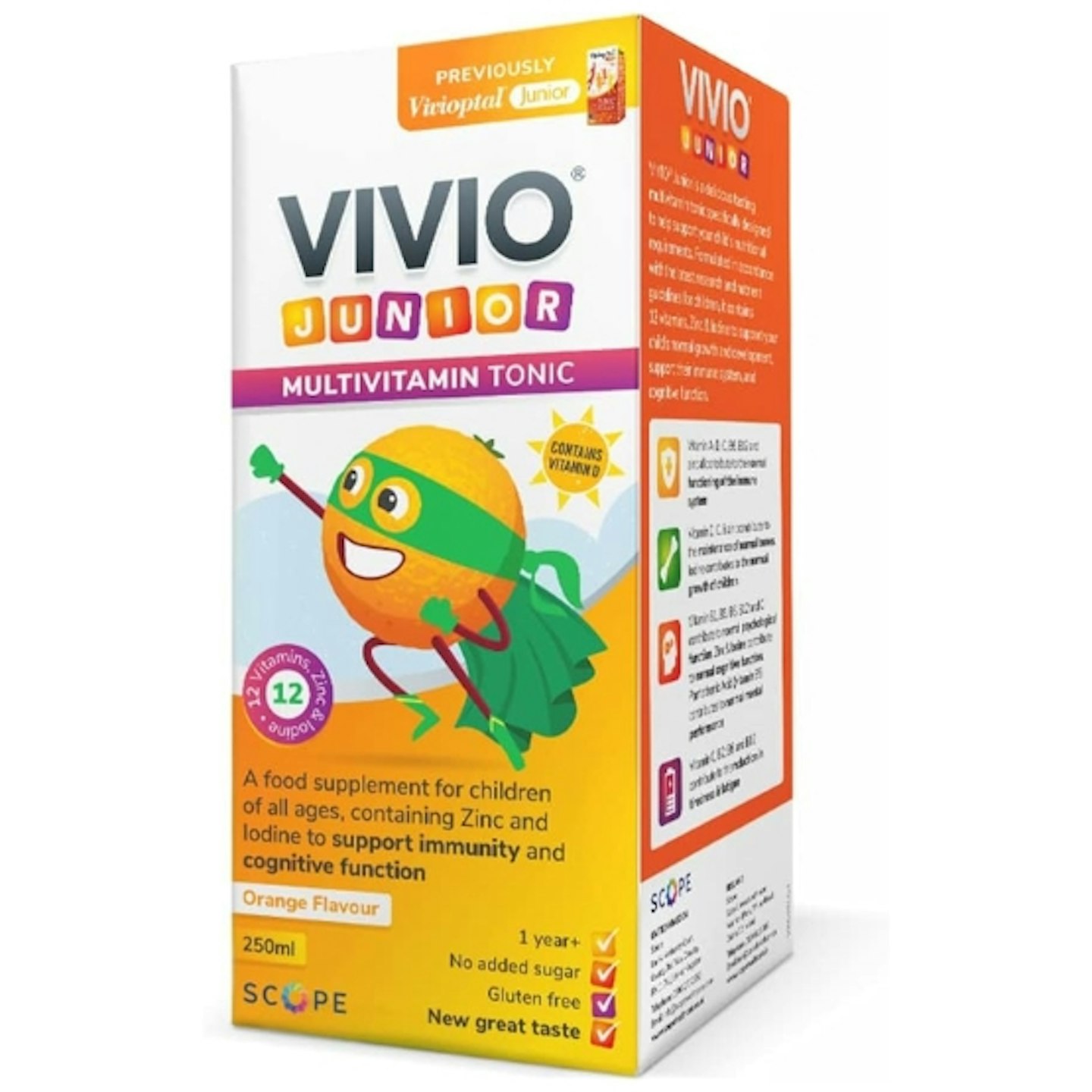 Image: Amazon
Image: AmazonIf you're after a vitamin tonic, we suggest the VIVIO Junior Multivitamin Tonic for Kids. It's Ideal for babies over the age of one, and contains 12 vitamins - A, B1, B2, B3, B5, B6, B12, C, D and E, Biotin and Folic Acid. Plus zinc and Iodine to provide nutritional support to help with normal immune system function, cognitive function, and bone growth.
Our Reviews Editor, Samantha, said that although it tasted more like diluted orange, her son didn't complain about taking the Multivitamins. She did, however, notice a difference in his general health and found he seemed a bit more lively, even if he did have a sniffly nose.
There’s no added sugar, and it’s gluten and lactose-free. As well as being suitable for vegetarians, we like that it's also suitable for halal diets.
Pros
- Helps support the immune system with a range of vitamins, Zinc and Iodine
- Helps with cognitive function and growth
- The orange flavour seems to be popular with most reviewers
- Suitable for vegetarian and halal
Cons
- The orange flavour is quite weak
| Volume: | 250ml |
| Flavour: | Orange |
| Primary supplement: | Folic Acid, Zinc and B12 |
| Suitable for ages: | 1+ years |
Best baby vitamins for powdered varieties
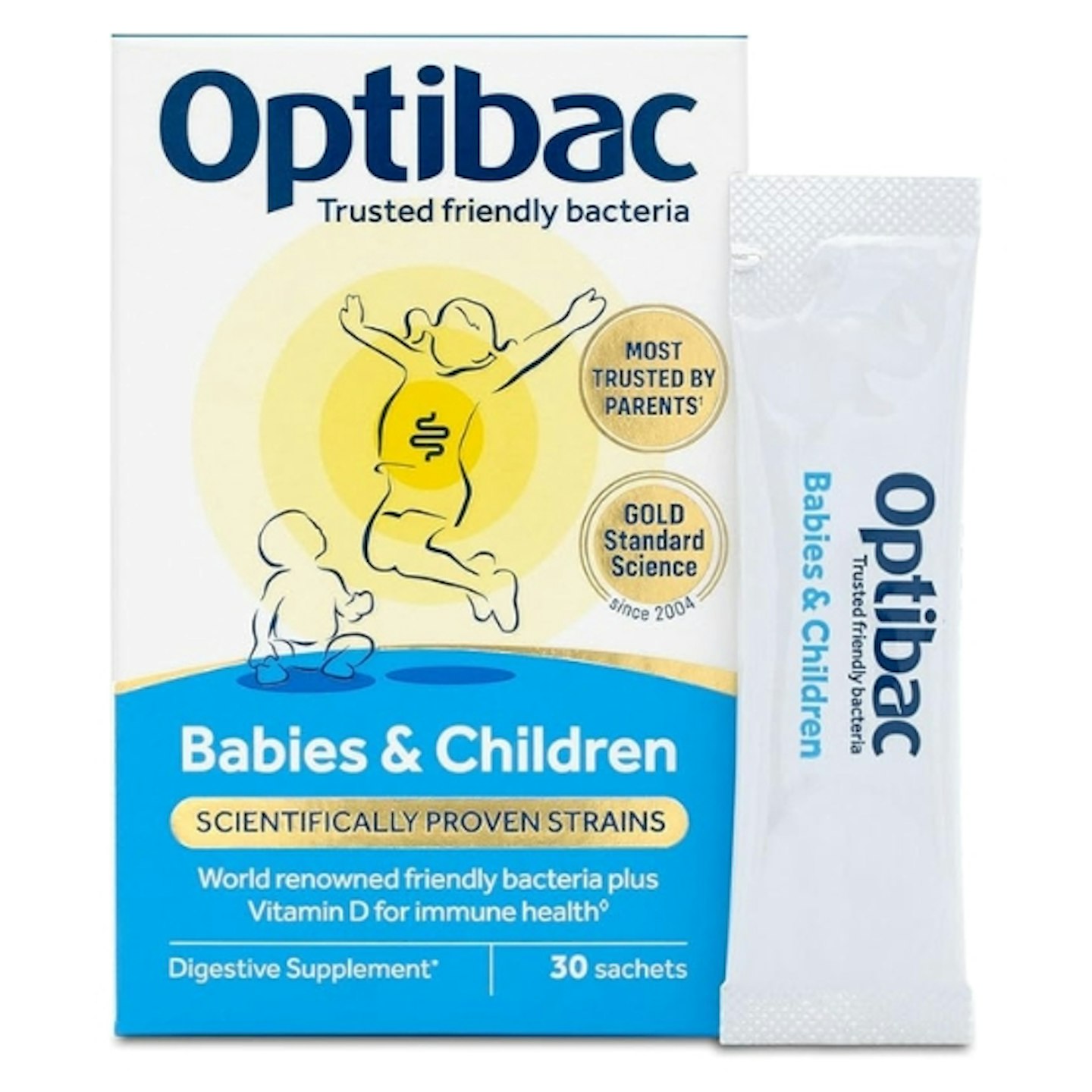 Image: Amazon
Image: AmazonWe've chosen the Optibac for Babies & Children as our best pick for those looking for a powdered vitamin. It combines three probiotic strains with Vitamin D3 to help maintain a healthy gut and maintain immune health. While some thought this one was more expensive than other brands, the pack contains 30 sachets, which are already pre-measured for your child and can be easily mixed into food or drink, making them super convenient. They’re suitable for vegetarians and are lactose, gluten and soy-free with no added sugar.
Parents were impressed with the results, and many agreed it's effective in relieving their baby's colic, reflux, constipation or trapped wind, with one reviewer saying, “I have used this since my son was 8-9 months old and my goodness, it works wonders.. as soon as he takes this there is an instant difference”. Another said, "My newborn had trouble with trapped wind, major constipation and colic... and was never sleeping as she was in so much pain... then I came across these... and omg, I have a different baby...Highly recommended!!"
Pros
- Pre-measured in a sachet for easy use
- 30 sachets included
- Easily mixed with food and drink for easy administering
- Parents impressed with results for digestive discomfort
- Dairy, gluten and soy free
Cons
- More expensive than some brands
| Volume: | 30 sachets |
| Flavour: | None |
| Primary supplement: | Vitamin D3 |
| Suitable for ages: | Birth to 12 years |
SAVE £2.80
Best baby vitamins for growth and development
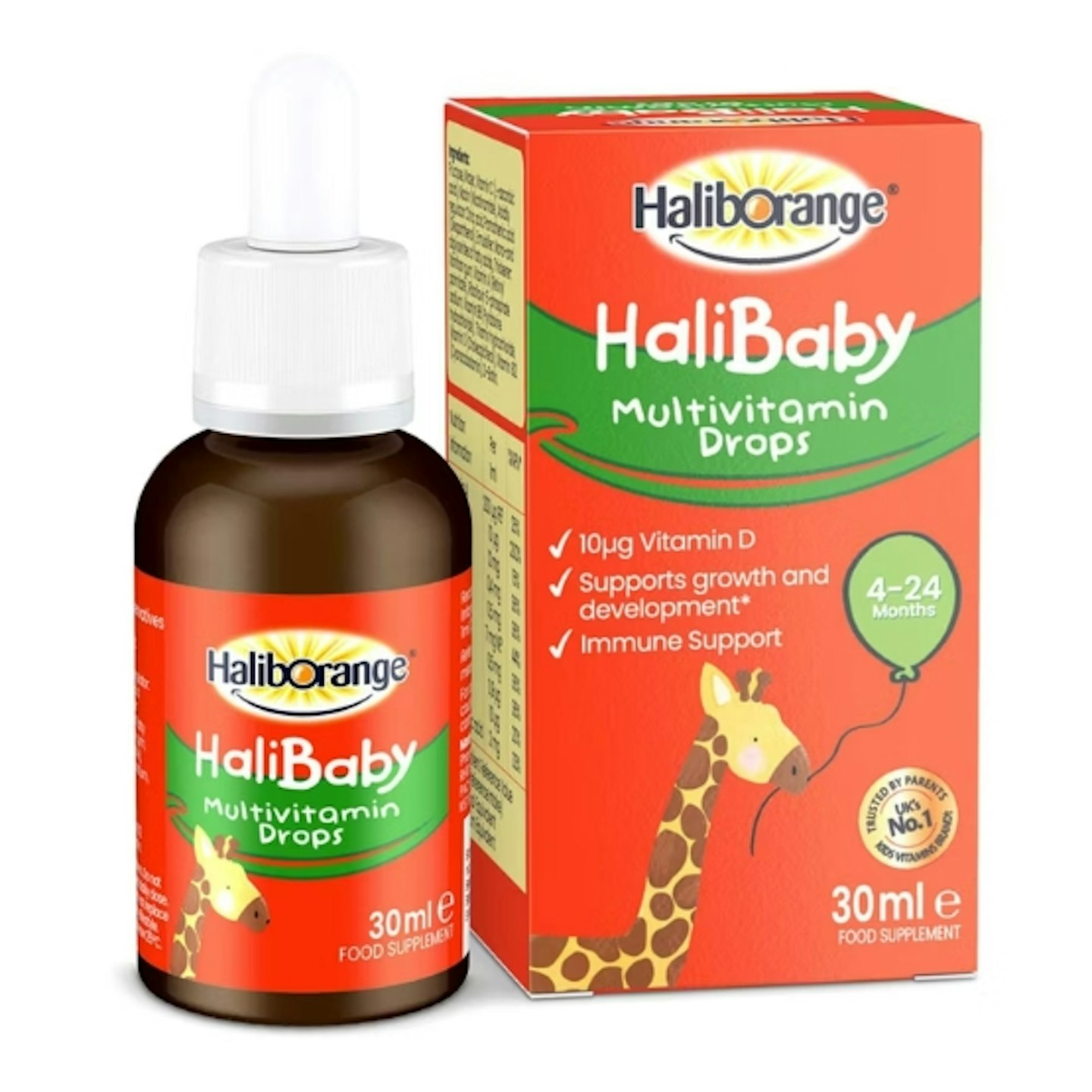 Image: Boots
Image: Bootswww.boots.com
The Haliborange Halibaby Multivitamin Drops contain 10 essential vitamins, including A, C and the recommended 10μg of Vitamin D, to contribute to healthy growth and development. They’re free from flavourings, colours, preservatives and can be mixed with water or milk. One reviewer felt the lack of flavour was a bonus, saying, “I love the flavourless drops, great for my fussy baby”.
Pros
- Contains 10 essential vitamins for healthy growth
- Suitable for breastfed babies, too
- Flavourless - great for fussy babies
- Can be mixed with water or milk
Cons
- Limited reviews online
| Volume: | 30ml |
| Flavour: | Orange |
| Primary supplement: | Vitamin D |
| Suitable for ages: | 4+ months |
Best baby vitamins supplement for gut health and Vitamin C
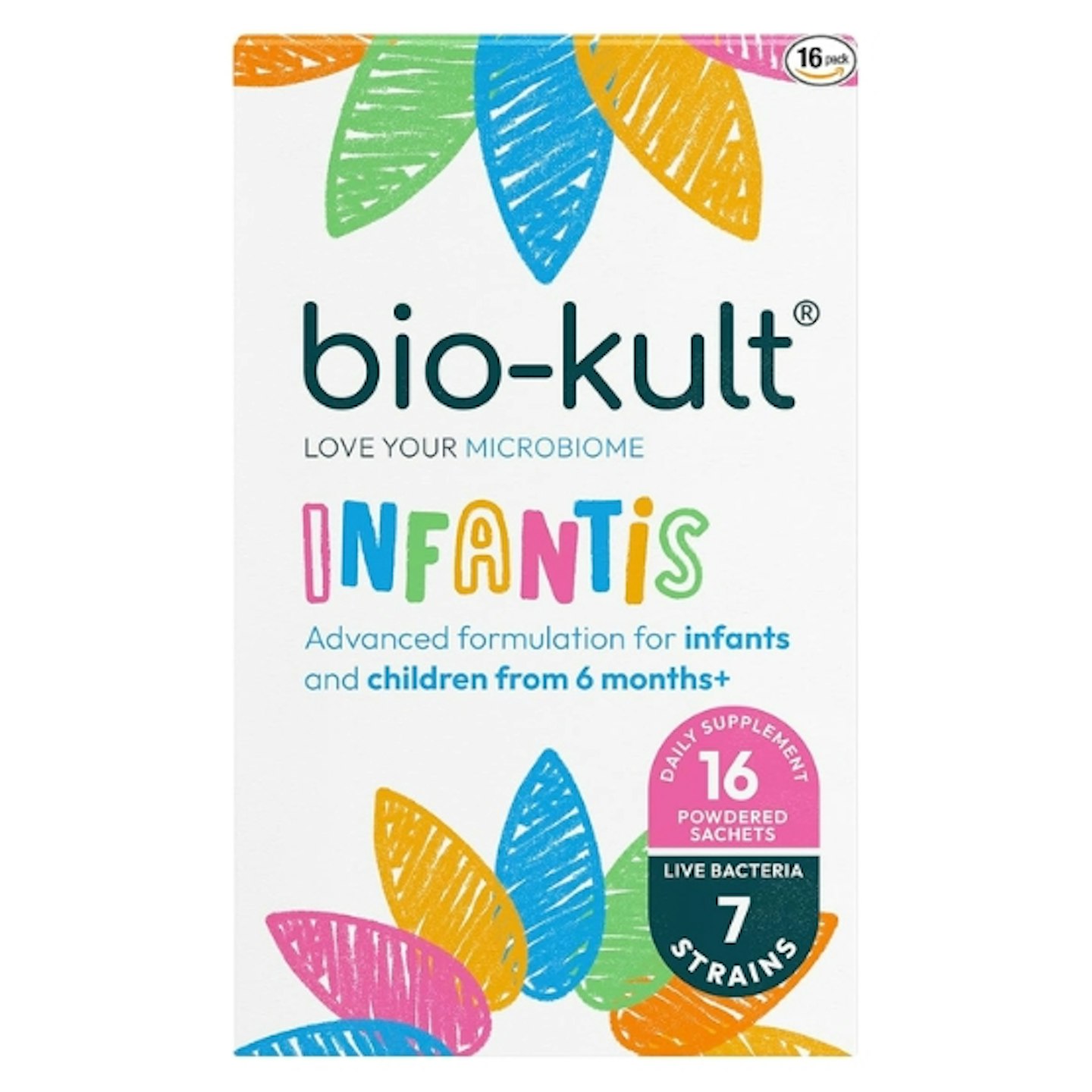 Image: Amazon
Image: AmazonWe like this powdered vitamin supplement for gut health as well as vitamin C. It has been formulated in the UK by Bio-Kult scientists and is specially designed for babies, toddlers and young children, making it a good option for those looking for the best vitamins for 1-year-old toddlers. It contains seven scientifically developed strains of live bacteria and fructo-oligosaccharides (FOS) to help young tums with their developing infant gut flora, keeping them healthy. In addition to this gut-friendly live bacteria, Bio-Kult Infantis contains Vitamin C to aid with the normal function of the immune system.
It contains 16 powdered sachets and is suitable for breastfed infants, although it might be harder to give it breastfed babies, and infants on less than 500ml of formula a day, and for all infants and children over 6 months. It's easy to use, just add one sachet a day to food, water or milk. In addition, it's gluten-free, suitable for vegetarians and has no artificial colours or flavours.
Pros
- Easy to use - just mix one sachet into food, water or milk
- Contains seven live bacteria strains
- Suitable from birth for breastfed babies and those on less than 500ml of formula
Cons
- Might be harder to give breastfed babies
| Volume: | 16 sachets |
| Flavour: | None |
| Primary supplement: | Live bacteria and Vitamin C |
| Suitable for ages: | From birth |
5% off
Best baby vitamin drops
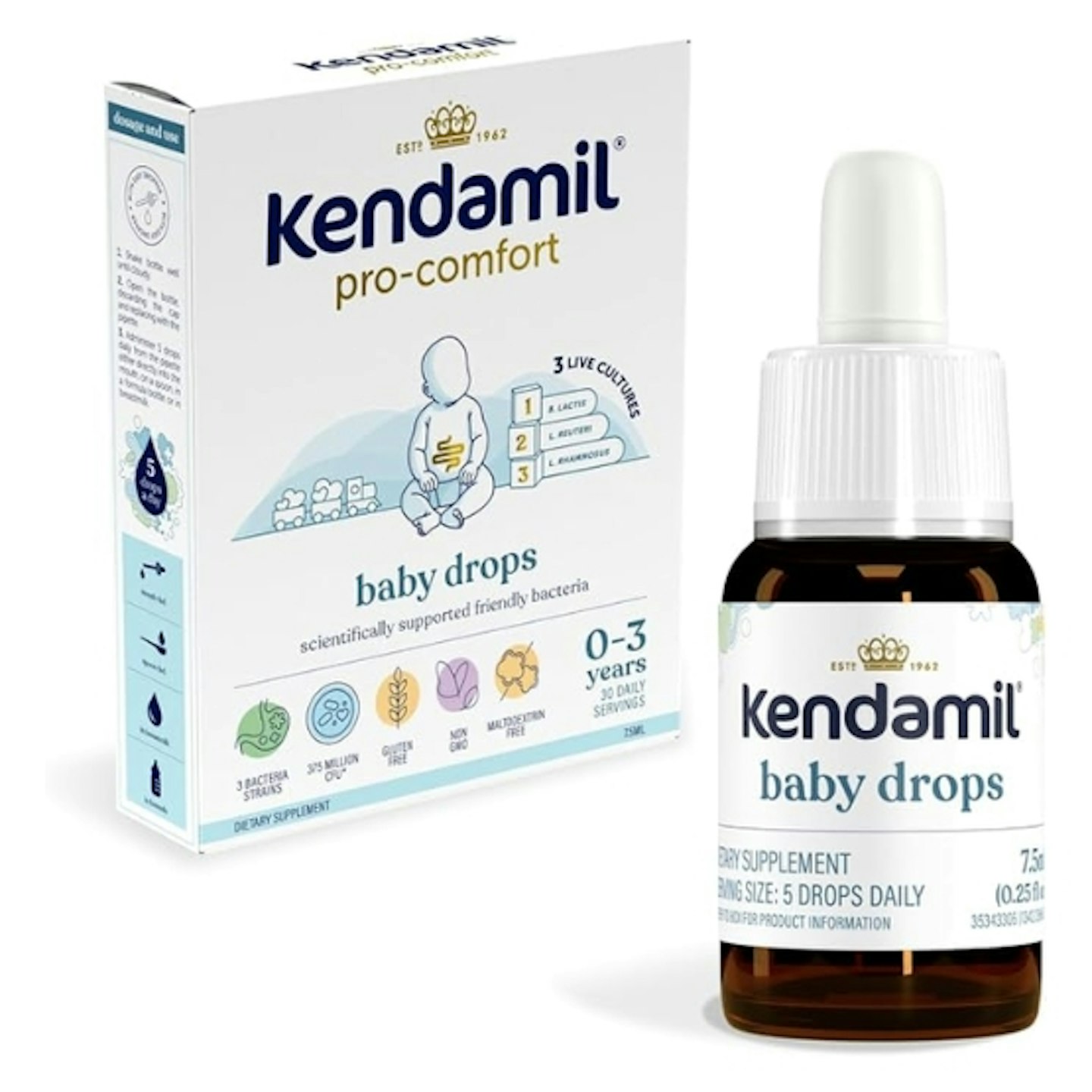 Image: Amazon
Image: AmazonContaining three live-friendly bacteria strains and 375 million live bacteria, the Kendamil Pro-Comfort Baby Drops support the development of your child’s microbiome, keeping everything in balance. One reviewer felt this helped with her baby’s trapped wind and irregular bowel movements, saying she ‘was recommended these from my sister who is a biomedical scientist, to help the microbiome in my baby's gut - it’s safe to say these have worked wonders for us. Bowel movements are more regular, and there is no trapped wind, so we have one happy little boy!"
Reviewers found it helped with constipation, colic and reflux, making their babies more comfortable and less gassy, with one saying, "Great product that has already helped my little boy after a week of use! I now have a much happier baby".
The drops are free from artificial colours, flavourings, sugar, gluten, soy and maltodextrin and can be used in conjunction with breastfeeding or bottle feeding. It uses an included pipette to measure out 5 droplets a day, and the 7.5ml bottle should last for 30 days. Some have warned to be careful as the bottle can leak when shaken.
Pros
- Contains live-friendly bacteria to maintain a healthy gut
- No artificial colours or flavourings
- Gluten, soy, sugar and maltodextrin-free
- A pipette is included to deliver an accurate amount
Cons
- Some report the bottle leaks when shaken
| Volume: | 7.5ml |
| Flavour: | None |
| Primary supplement type: | Three unique live bacteria strains |
| Suitable for ages: | Birth to 3 years |
SAVE 10%
If you're looking for the best vitamins for babies 6-12 months or the best multivitamin for 1-year-old toddlers, we like this liquid multivitamin, made for infants ages six months to four years old. Vitabiotics Wellbaby Multi-Vitamin Liquid contains 14 essential vitamins, including vitamins A, C and D, to help the growth and development of bones in children and to support their immune systems. It's free from artificial sweeteners, colours or flavours and does not contain lactose, alcohol or yeast.
It can be mixed into milk or water, making it easy to use, and one reviewer said that this was “perfect for little ones. I pop one spoonful in my child’s milk every morning”. Another parent agreed, saying, "I have used this vitamin for my son since he was 6 months and have found this one to be the most effective with ease of administering as he likes it and doesn’t put up a fight like some of the others I have tried over the last 2 years”.
However, reviewers were mixed on the flavour, with some parents saying their babies and children loved the flavour and others saying their children didn’t enjoy it, but this is largely down to personal preference.
Pros
- Contains 14 essential vitamins
- No artificial sweeteners or flavourings
- Suitable for vegetarians
Cons
- Some might not like the taste with no flavourings
| Volume: | 150ml |
| Flavour: | None |
| Primary supplement: | Vitamin A, Vitamin D and Vitamin C |
| Suitable for ages: | 6 months to 4 years |
Are vitamins necessary for babies?
Registered Midwife and Kendamil Expert, Emma Thompson, said: "It's really important that babies take vitamin supplements, as recommended by the NHS. The guidelines recommend that all children aged six months to five years be given vitamin supplements containing vitamins A, C and D every day. It's especially important that babies who are being breastfed should be given a daily vitamin D supplement from birth."
Emma also mentioned that if you're formula feeding your baby, and they're having more than 500ml of infant formula a day, then they don't need vitamin supplements as the formula is already fortified with vitamins.
How else can I introduce vitamins to my baby's diet?
Emma said, "If the baby is older than six months and weaning, then ensuring a varied diet with a mix of vegetables, fruits, and dairy products will help. There is also the option to use a vitamin drop designed for babies, just ensure you check the dosage."
What vitamins do babies and children need?
Iron
When your baby is born, they have their own stock of iron and zinc, which have been passed on to them while in the womb. However, by the time they're six months old, those stocks are running out, and your baby needs 7.8mg of iron.
Dietician Jo Travers from The London Nutritionist says: "This is why you need to start weaning onto food at this age, milk does not provide enough nutrients for your baby, which is why you need food."
"While the formula is fortified with nutrients, including iron, you should also ensure that you wean them using iron-rich foods such as meat, dark poultry meat, beans, pulses and dark green leafy vegetables"
It’s worth remembering that calcium can prevent the absorption of iron, so giving them milk at the same time as a plate of baked beans could potentially limit the iron content of the beans. To counter this, ensure you serve up foods containing vitamin C alongside them, as they can aid the absorption of iron.
Vitamin C
This nutrient is needed to help absorb iron from food. Jo says: "While calcium is a very important nutrient for ensuring your baby builds up strong bones and teeth, it can also inhibit the absorption of non-haem iron".
"This comes from vegetable sources such as spinach or kale. However, you can boost absorption by eating foods containing vitamin C, such as oranges, peppers, kiwis and broccoli."
Vitamin C also helps to strengthen your baby’s immune system, which can be quite weak in the early years of life.
Vitamin D
This is probably one of the most crucial vitamins needed. "It’s made when sunlight hits the skin, but because the levels of sunlight in the UK can be quite low, it’s vital that children aged between six months and five years take a supplement drop containing vitamin D," says Julie Clark.
"However, babies who are fed infant formula will not need vitamin drops until they are receiving less than 500ml (about a pint) of infant formula a day, as these products are fortified with vitamin D." There are a few dietary sources of vitamin D – fortified breakfast cereals and margarine, but NHS advice states that you should boost your baby’s sources with a supplement.
Vitamin A
Essential for eye health, normal growth, development and the immune system, vitamin A (the beta carotene variety) can be found in orange and yellow coloured foods such as carrot, butternut squash and mango.
Omega-3 and 6
Omega-3 and 6 are an important part of a child's diet to support brain growth and development.
Parenting expert Lorraine Thomas, founder of the Parent Coaching Academy, says: “Science has found that a blend of omega-3 and 6 in the diet helps with behaviour, memory and, as a result, learning. They also help with sleep patterns, according to researchers from Oxford University. They found children who had a diet rich in omega-3 and omega-6 slept for longer and woke up less in the night compared to those children who did not have a diet rich in omega-3 and omega-6.”
How can I help increase my child's intake of vitamins?
Clinical Nutritionist at VIVIO Junior, Eva Hill Hamilton, said 80% of parents worry that their child doesn't get all the nutrients from their diet alone. She shares her top tips for boosting their intake of key vitamins to keep them at their best:
Keep it real: The foods we feed our children should resemble 'real foods' as much as possible. Encourage your child to help you prepare fruits and vegetables to spark their interest and build their confidence when it comes to new foods or foods they tend to refuse. Blend up chickpeas to make your own hummus for dipping veggie sticks or mashing up your child's favourite fruits.
Don't forget protein: We tend to focus a lot on fruits and vegetables when it comes to our children’s wellbeing, and forget healthy proteins like cubes of chicken, beans and lentils, and seeds and nuts, which are packed with immune-boosting nutrients like omega 3s, iron, vitamin D and selenium. Ensuring your child has a serving of protein with every meal and snack is key to supporting healthy growth and development.
Enjoy variety: Family life can be hectic at times, so it’s understandable to want to make the same meals that you know your little one will eat. However, with over 70% of our immune cells living in our gut, ensuring your little one eats a rainbow of fruit and vegetables is a great way to ‘feed’ the good bacteria living in your child’s gut and fend off those bugs and germs. Pasta is a popular choice for lots of little ones, so offering different types, such as pasta made from beans and lentils or spelt pasta, which contains more nutrients, are both great ways to include more diverse foods in our children’s diet.
Is it okay to not give my baby vitamin drops?
Emma said: "What your baby might need will depend on their feeding routine. All breastfed babies will need a Vitamin D supplement from birth, and all families can talk to their healthcare providers to get the right options for their little ones."
Why you can trust us
At Mother&Baby, our mission is to provide accurate and reliable information and reviews, ensuring our readers receive honest and transparent feedback about the best products available.
Our testers are either pregnant or real parents with a baby or a toddler. This could be members of our editorial team, freelance parenting journalists or external reviewers from the Mother&Baby awards. Our Mother&Baby Awards are renowned in the industry and are among the most highly respected product awards for baby and parenting products. Every year, we arrange for thousands of independent parent reviewers to test the latest products on the market. Alternatively, we turn to experts to help us provide the insight we need about products that we can't get hold of to test, and we refer to verified purchase reviews to inform our recommendations.
We don't accept payment from manufacturers for product reviews, and maintain our editorial independence. While we do work with commercial partners on advertorials, these will always be clearly labelled.
Our writers have full control over their content, ensuring that products are selected based solely on the needs of our readers. While we may earn commissions or other compensation from links on our website, this does not affect our product choices. These links allow us to continue offering valuable consumer advice, without compromising the integrity of our reviews. We are always honest in our reviews, and we won't recommend products that we wouldn't spend our own money on.
Read more about how we test and why you should trust us.
About the Experts
Eva Hill Hamilton is a Clinical Nutritionist who works with VIVIO Junior and advises on the best way for babies and children to get the right nutrients.
Jo Travers is a registered dietitian and author, and provides nutrition advice. She is a professional, evidence-based London nutritionist.
Julie Clark is a registered Nutritional Therapist and aims to help families enjoy a healthy life. She uses her knowledge as a nutritionist and as a parent to give practical and easy advice.
Emma Thompson is an expert who works with Kendamil and is also a registered midwife.
Alexa Mullane, a Nutritional Therapist and Health Coach, reviewed this article.
I'm not a Prime member - how can I get involved?
Signing up to be a Prime member costs £8.99 per month, or £95 for the year if you pay upfront (saving you £16.88). If you've not had a free trial in the last year, you may also be able to take advantage of a 30-day free trial.
Being a Prime member gives you not only access to exclusive deals, but also free delivery, Amazon Music, Prime Video, and loads more benefits, including Try Before You Buy on plenty of fashion items.
There are a few kids tablet and technology deals live on Amazon right now, so if you scroll down you can snap up a bargain before Prime Day is even here.
How long will Amazon Prime Day 2025 last?
It will last for four days and deals will be dropping every day. As ever, the Mother&Baby team will be bringing you the best deals as soon as we spot them so sign up to the Mother&Baby newsletter to find the lowest prices on the brands and products we know parents love.
Author
Samantha Ball is a Features & Reviews Editor for Mother&Baby, having written for the brand since 2018. She's a mum of two and loves browsing for the best and current trending products for little ones and for cute seasonal outfits.
